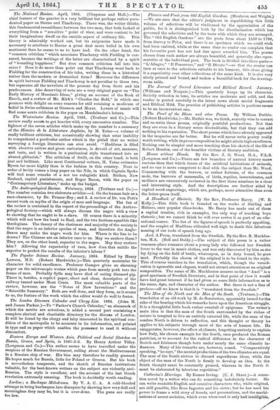The National Review. April, 1864. (Chapman and Hall.)—The chief feature
of the quarter is a very brilliant but perhaps rather para- doxical paper on Sterne and Thackeray. There was, the writer thinks, this fundamental resemblance between the two men, that both looked at everything from a "sensitive " point of view, and were content to let their imaginations dwell on the outside aspect of ordinary life. This theory is admirably worked out, but its exigencies have made it necessary to attribute to Sterne a great deal more belief in his own sentiment than he seems to us to have had. On the other hand, the "common criticism " which associates Thackeray with Fielding is cen- sured, because the writings of the latter are characterized by a spirit of " bounding happiness." But does common criticism fall into this error ? Does it do more than point out that Thackeray went back to Fielding for the construction of his tales, writing them in a historical rather than the modern or dramatical form? Moreover the difference in spirit between Fielding and Thackeray is not peculiar to those two, but separates all the novelists of the present day from Scott and his predecessors. Also deserving of note are a very original paper on "The Early History of Messianic Ideas," giving an account of the Book of Enoch, and a review of Mr. Kirk's "Charles the Bold," in which one pounces with delight on some reasons for still retaining a modicum of belief in Swiss nobleness at Granson and Morat. Lovers of music will find some acute criticism in the paper on Mendelasohn's letters.






























 Previous page
Previous page